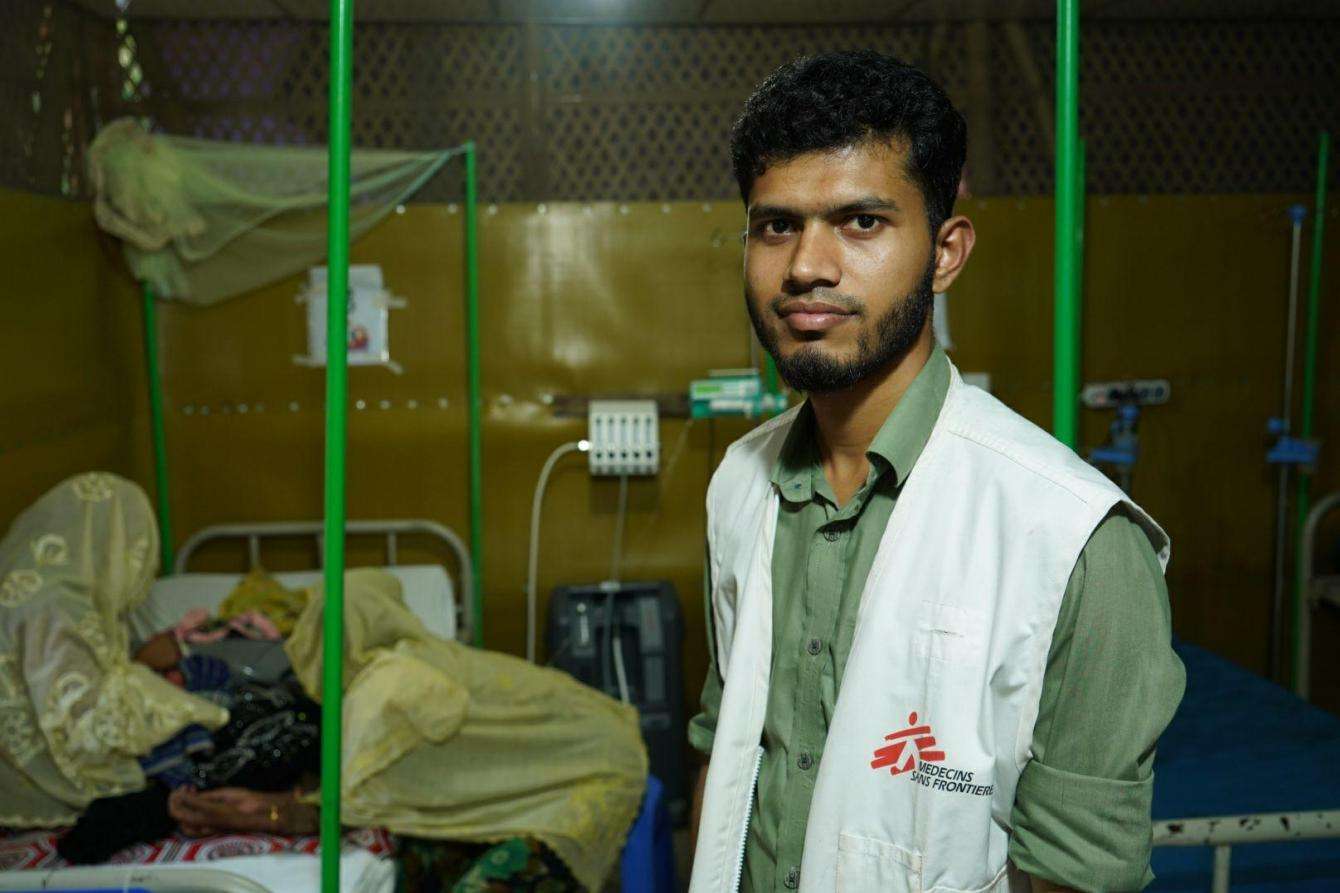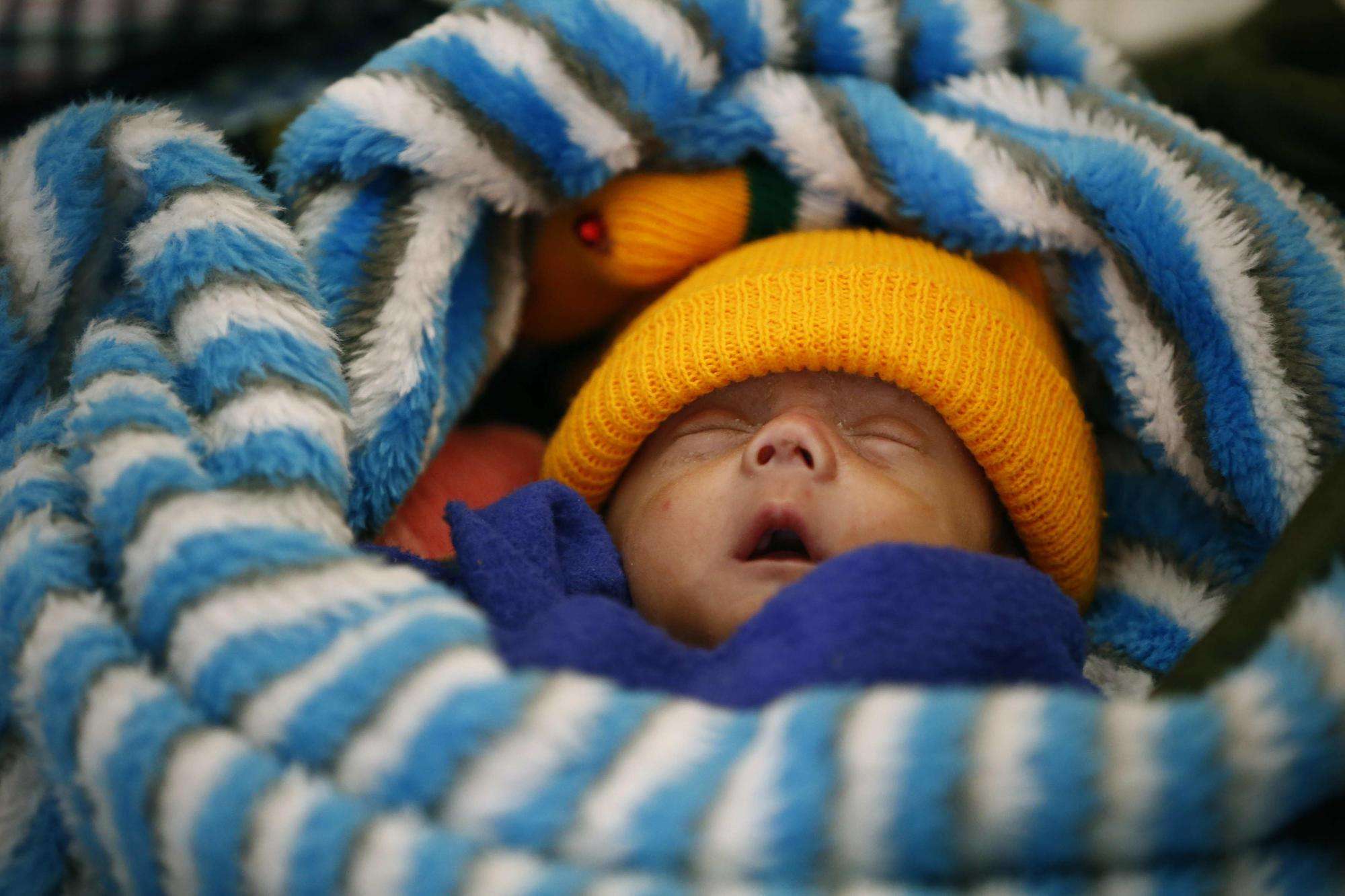Nearly two years after they began crossing into Bangladesh after fleeing horrific violence and persecution in Myanmar, more than 700,000 Rohingya people are still trapped in precarious living conditions in refugee camps near the border. Denied access to health care for years in Myanmar, many of them still have trouble reaching the services they need. The influx of refugees has also strained Bangladeshi health services. In Ukhia, Bangladesh, Doctors Without Borders/Médecins Sans Frontières (MSF) runs the Goyalmara Green Roof hospital, where a team provides specialized care to mothers and children, Rohingya and Bangladeshi alike.
Inside the neonatal intensive care unit, a newborn baby is struggling to breathe. MSF nurse supervisor Gaziur Rahman and his colleagues get to work. The baby’s young Rohingya parents haven’t even had a chance to name the infant girl. Rahman is helped by a team of nurses who take turns carrying out bag-valve mask ventilation, a method of squeezing a bag to help a baby breathe in oxygen. A digital pulse oximeter displays her heart rate and blood oxygen levels; the reading of 60 to 70 percent oxygen level does not augur well.
Ten minutes pass. Rahman looks determined but does not want to give the baby’s parents false hope. He speaks softly: “The prognosis does not look good.”
Raising awareness
Twenty-five miles away in the town of Cox’s Bazar, MSF medical coordinator Jessica Patti is facing another challenge. It’s not enough to open a hospital and wait for the patients to arrive—before they can come they have to know it’s there. MSF staff have been increasing their efforts to raise awareness about the Goyalmara hospital amongst other humanitarian organizations providing aid in the region.
“The first 28 days for newborns are critical—they need both preventive and curative medical care,” says Patti. “Unfortunately, lack of health care facilities for both refugees and Bangladeshi citizens can mean newborns are extremely susceptible to death in their first month. We opened Goyalmara hospital to focus on neonatal and pediatric care, and we want unwell newborns to be referred here from other hospitals in order to receive specialized care.”
Referrals are critical to saving lives. Take eclampsia, a condition in which a pregnant mother suffering from high blood pressure gets convulsions which can prove deadly to both mother and child. Rohingya women prefer to give birth in the private spaces of their house, with assistance from trusted traditional birth attendants. But when urgent complications occur, such as eclampsia, the time it takes to travel from the refugee settlements to a basic health outpost and then on to a dedicated maternity hospital can mean the difference between life and death. If patients are transferred directly to Goyalmara from other health facilities, says Patti, more lives can be saved.

Caring for mothers and babies
Back in the neonatal intensive care unit, the newborn seems to be improving. The oximeter shows increased levels of oxygen in her blood, a sign that her condition might stabilize. Rahman rubs her tiny chest. Her body is showing signs of movement, a noticeable change from 15 minutes ago when she seemed lifeless. The next milestone will be for her to breathe spontaneously and unassisted. The baby's mother is teary-eyed, and the father is pacing outside the ward.
Despite the improvement, the timeframe for survival is closing fast. Bag-mask valve ventilation can prolong a newborn’s life, but unless the baby can breathe unassisted, the resulting flow of oxygen can cause neurological problems and ultimately death. If there is no improvement in the baby’s condition, the team will have to end resuscitation and prepare the family for a likely death. For Rohingya families who have already experienced violent and traumatic events in their flight from Myanmar to Bangladesh, losing yet another loved one can take an unimaginable mental toll.
Reaching the refugee camps in Bangladesh is not a guarantee of survival for Rohingya refugees, especially babies. A refugee newborn’s chances of survival often depend on escaping the crowded and unsanitary conditions of the settlements. Many Rohingya refugees in Bangladesh are unable to reach appropriate medical care until it is too late.
Reasons for this can include traditional practices of the community, an understandable lack of trust in unfamiliar health facilities, and difficulties moving within and outside the camps. Humanitarian organizations operating in the region—including MSF—need to do more to understand the barriers to care the Rohingya people face. There is also a need to increase access to specialized health care facilities like Goyalmara hospital.
Facing an uncertain future
In the neonatal ward, the baby continues to improve. A newborn cannot express pain or relief, so the MSF medical team must look for visual cues such as skin color, the squeezing of eyelids, and hand movements to ascertain if a baby is suffering or improving, and to manage any pain. There is palpable optimism in the intensive care unit as the tiny girl’s arms rise, fists clenched, as if to show readiness for a fight. Rahman and his team of nurses continue to pump the oxygen bag.
MSF’s Goyalmara Green Roof hospital is a specialized facility for neonatal, pediatric, and maternity care. The hospital has neonatal and pediatric wards with dedicated intensive care facilities, a maternity ward, an outpatient department, and an emergency room for all adults.
We also run a comprehensive mental health care program for children and adults in addition to outreach and health promotion activities. Since October 2018, the hospital has admitted 217 newborns and 247 children for neonatal and pediatric care. The maternity ward has admitted 348 patients and 127 deliveries have been assisted.




